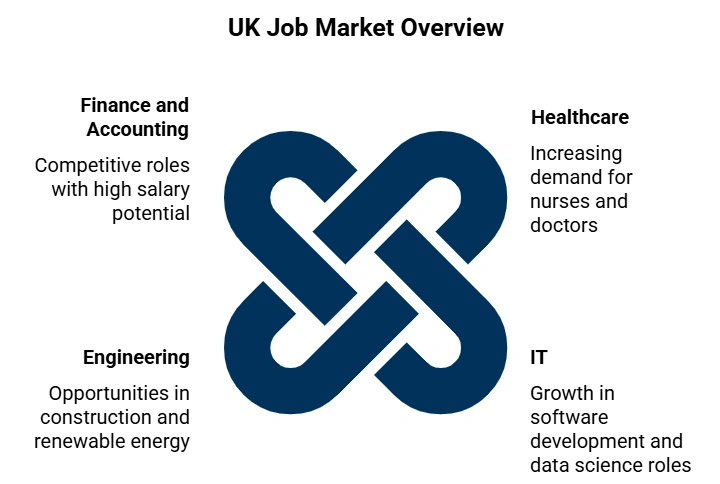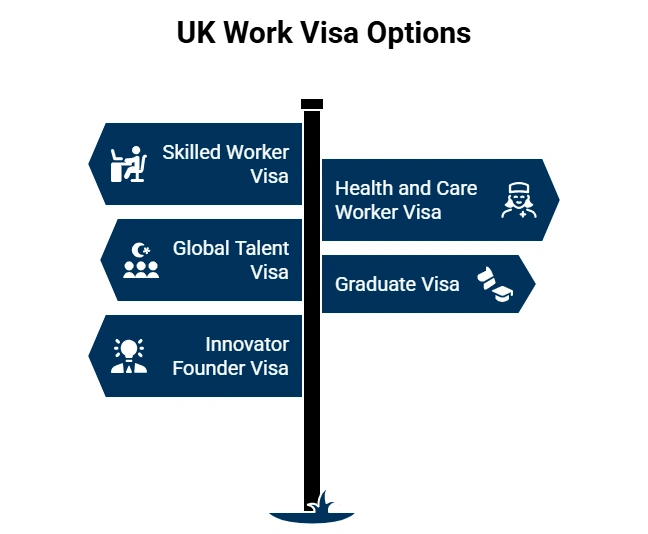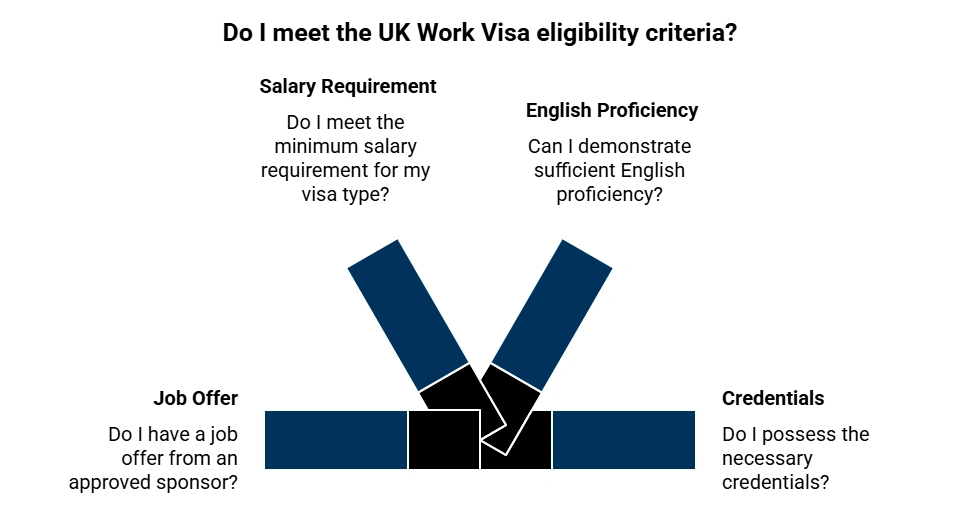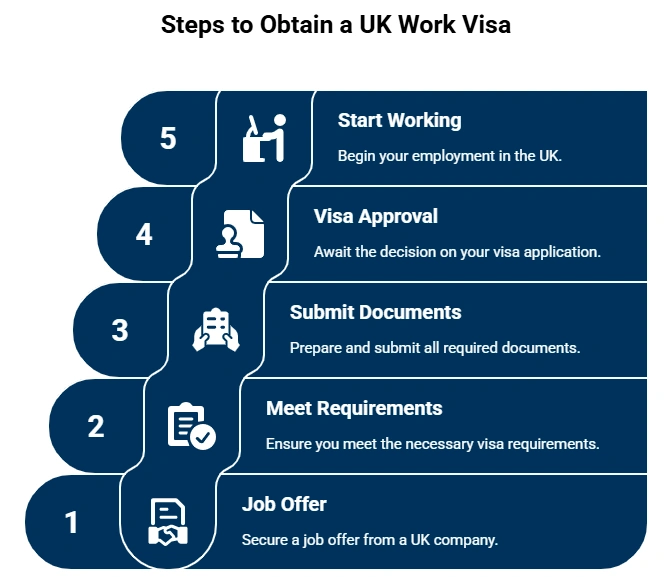The UK job market is strong, with a need for skilled workers in many fields. It's a large global economy, so there are chances to work in IT, healthcare, engineering, finance, and teaching. The UK work visa rules and chances for moving up in your career make it a good place for professionals from other countries.

*Want guidance to apply for UK Work Visa? Y-Axis is here to offer you complete guidance with the process.
The UK is a popular place for skilled workers around the world. It has a varied economy, good healthcare, and education, and offers good pay and benefits. Those in IT, healthcare, and engineering can find many chances to grow in their careers and have a good work-life balance.
The UK job market shows strong demand across sectors like healthcare, tech, education, logistics, and trades. With updated visa rules and the Immigration Salary List (ISL), job seekers can benefit from faster processing and reduced salary thresholds in eligible roles.
The table below has the list of top sectors in the UK along with the in-demand occupations for each:
| Sector | In-Demand Occupations |
| Healthcare & Social Care | Registered Nurses, General Practitioners, Pharmacists, Care Assistants, Physiotherapists |
| Information Technology & Digital Tech | Data Analysts, Cybersecurity Experts, AI/ML Engineers, Cloud Architects, IT Support Technicians |
| Education & STEM Teaching | Mathematics Teachers, Physics Teachers, Computer Science Teachers, Early Childhood Educators |
| Construction & Skilled Trades | Electricians, Plumbers, Welders, Builders, HVAC Technicians |
| Logistics & Retail | HGV Drivers, Warehouse Supervisors, Logistics Coordinators, Retail Assistants |
| Hospitality & Tourism | Chefs, Front Office Staff, Housekeeping Staff, Event Coordinators |
The healthcare field in the UK keeps expanding because the population is getting older and there are more funds for the NHS. So, there is a requirement for doctors, nurses, and medical scientists.
| Job Role | Average Annual Salary (GBP) |
| Specialist Doctor | £60,000 – £120,000 |
| General Practitioner | £45,000 – £80,000 |
| Registered Nurse | £30,000 – £50,000 |
| Pharmacist | £35,000 – £55,000 |
| Physiotherapist | £30,000 – £50,000 |
| Medical Laboratory Technician | £25,000 – £45,000 |
| Radiologist | £55,000 – £100,000 |
| Healthcare Manager | £45,000 – £70,000 |
| Occupational Therapist | £30,000 – £45,000 |
| Aged Care Worker | £20,000 – £30,000 |
The UK's tech business is strong, so there's a bigger need for software developers, data people, and cybersecurity experts. This sector should get about 10% bigger each year.
| Job Role | Average Annual Salary (GBP) |
| Software Developer | £35,000 – £60,000 |
| Data Scientist | £40,000 – £75,000 |
| Cybersecurity Expert | £45,000 – £80,000 |
| Cloud Engineer | £40,000 – £70,000 |
| AI Engineer | £50,000 – £85,000 |
| IT Project Manager | £50,000 – £75,000 |
| Network Engineer | £30,000 – £55,000 |
| Business Intelligence Analyst | £35,000 – £60,000 |
| DevOps Engineer | £40,000 – £70,000 |
| UX/UI Designer | £30,000 – £50,000 |
The UK's engineering field is expanding quickly. Civil, mechanical, and electrical engineers are in demand. Renewable energy jobs are also becoming more common.
| Job Role | Average Annual Salary (GBP) |
| Civil Engineer | £35,000 – £55,000 |
| Mechanical Engineer | £35,000 – £60,000 |
| Electrical Engineer | £40,000 – £70,000 |
| Renewable Energy Engineer | £45,000 – £75,000 |
| Project Manager (Engineering) | £50,000 – £85,000 |
| Architect | £40,000 – £65,000 |
| Structural Engineer | £40,000 – £60,000 |
| Building Services Engineer | £45,000 – £70,000 |
| Quantity Surveyor | £35,000 – £55,000 |
| HVAC Engineer | £35,000 – £60,000 |
The UK is still a major global financial center. There's a good need for financial analysts, accountants, and investment bankers. The financial services area keeps growing steadily.
| Job Role | Average Annual Salary (GBP) |
| Financial Analyst | £35,000 – £50,000 |
| Chartered Accountant | £40,000 – £70,000 |
| Investment Banker | £60,000 – £120,000 |
| Tax Consultant | £40,000 – £65,000 |
| Auditor | £30,000 – £50,000 |
| Risk Manager | £50,000 – £80,000 |
| Financial Planner | £40,000 – £60,000 |
| Credit Analyst | £30,000 – £50,000 |
| CFO (Chief Financial Officer) | £100,000 – £200,000 |
| Treasury Manager | £45,000 – £75,000 |
In the UK, there is a requirement for teachers, especially in STEM, special education, and at the university level.
| Job Role | Average Annual Salary (GBP) |
| Primary School Teacher | £25,000 – £40,000 |
| Secondary School Teacher | £30,000 – £50,000 |
| ESL Teacher | £25,000 – £40,000 |
| University Lecturer | £40,000 – £60,000 |
| Special Education Teacher | £30,000 – £50,000 |
| Vocational Trainer | £35,000 – £55,000 |
| Academic Advisor | £35,000 – £50,000 |
| Teaching Assistant | £18,000 – £25,000 |
| Curriculum Designer | £40,000 – £55,000 |
| School Administrator | £45,000 – £70,000 |
| Criteria | Immigration Salary List (ISL) | Old Shortage Occupation List (SOL) |
| Purpose | Prioritises roles with labour shortages | Identified hard-to-fill occupations |
| Salary Threshold | 80% of going rate allowed (e.g., £30,960 for care workers) | 80% of going rate allowed |
| Key Sectors | Health, Education, IT, Trades | Mostly health and skilled trades |
| Sponsorship | Still eligible for Skilled Worker visa | Eligible under Skilled Worker visa |
| Updated By | UK Migration Advisory Committee (MAC) | Discontinued in 2024 |
International individuals in the UK can apply for these UK work visas.

The UK Skilled Worker visa lets people from outside the EEA and Switzerland work in the UK. They need a licensed sponsor and an eligible job. It took the place of the Tier 2 (General) work visa. It is part of the UK's points-based immigration system. With this visa, people can live and work in the UK for up to five years. After five years, they can apply to live in the UK permanently.
The UK Health and Care Worker visa is a type of Skilled Worker visa. It's for doctors, nurses, health professionals, and adult social care workers who want to work in the UK for the NHS, an NHS supplier, or in adult social care.
The UK Global Talent visa is for people with skills or potential in certain fields who want to work in the UK. It is aimed at leaders and future leaders in areas such as tech, arts, culture, academia, and research. If your application is accepted, you can live and work in the UK for a long time, and it might lead to permanent residency.
The UK Graduate Visa lets overseas students remain in the UK and find work after they get their degree. Students don't need a job lined up to apply for this visa. With it, they can work in almost any job for two years. If they have a PhD, they can stay for three years.
The UK Innovator Founder visa lets experienced business owners create and manage a business in the UK. You need a business idea that's new, realistic, and can grow. This idea must be approved by a Home Office-approved organization. The visa is good for up to three years. After that, you can extend your stay or apply to live in the UK permanently.
The eligibility criteria for the UK Work Visa are given below.

The documents required to apply for the UK work visa are given below.
The procedure to apply for UK work visa is given below.
Step 1: Get a job offer from a UK company.
Step 2: Make sure you meet the requirements for the kind of visa you need.
Step 3: Get your documents ready and send them in.
Step 4: Wait to see if your visa is approved.
Step 5: Begin working in the UK after you get your visa.

Detailed information about the processing times of various UK work visas are given below.
| Visa Type | Estimated Processing Time |
| Skilled Worker Visa | 8 weeks |
| Health and Care Worker Visa | 4 to 6 weeks |
| Global Talent Visa | 8 to 12 weeks |
| Graduate Visa | 4 to 8 weeks |
| Innovator Founder Visa | 6 to 8 weeks |
Detailed information about the costs involved in the application of the UK Work Visa is given below.
| Visa Type | Estimated Application Fee (GBP) |
| Skilled Worker Visa | £610 – £1,408 |
| Health and Care Worker Visa | £232 – £464 |
| Global Talent Visa | £458 |
| Graduate Visa | £700 |
| Innovator Founder Visa | £1,021 |
You can follow the below steps to apply for jobs in the UK:
Step 1: Identify a job that appears on the Immigration Salary List (ISL).
Step 2: Check if you meet the role's eligibility criteria – this includes experience, English language proficiency, and salary threshold.
Step 3: Secure a job offer from a UK-licensed sponsor authorized to issue Certificates of Sponsorship (CoS).
Step 4: Gather required documents: CoS, valid passport, proof of salary offer, English test results, and financial evidence.
Step 5: Submit an online application for the Skilled Worker Visa through the UK Home Office portal.
Step 6: Attend your biometrics appointment at a visa application centre and wait for a decision (typically within 3–8 weeks).
The benefits of working in the UK are given below.
Y-Axis has 25+ years of experience with immigration services. Our services include:
Explore what Global Citizens have to say about Y-Axis in shaping their future
Australia PR Visa
One of our client Varun Mathur has opted
Read More...
Australia PR Visa
Uday Seshadri giving feedback after rece
Read More...
Australia PR Visa
Y-Axis received a great feedback from Su
Read More...
In the UK, jobs in health, IT, engineering, finance, and teaching are in high demand. Hospitals and clinics are actively seeking nurses and doctors. IT companies need software developers, data experts, and cybersecurity pros. There's a steady need for engineers in mechanical, electrical, and civil fields, along with finance people such as analysts and accountants. Schools also need teachers, especially in science, technology, engineering, and math.
The qualifications required for healthcare jobs in the UK are given below.
The IT job market in the UK is doing well. Software developers, data scientists, cybersecurity experts, and cloud engineers are in high demand. Growth in the sector is fast, thanks to progress in AI, machine learning, and cloud computing.
Cities such as London, Manchester, and Bristol have many opportunities. IT salaries differ; for instance, software developers usually earn £35,000 to £60,000, and data scientists make £40,000 to £70,000 each year.
In the UK, engineering jobs are available in fields like:
There is a high need for renewable energy engineers as the UK works toward sustainability. Because of big building projects and green energy plans, skilled engineers are increasingly needed. On average, engineers earn between £30,000 and £50,000, varying with experience. Senior roles, like engineering managers, can earn £70,000 or more.
Yes, the UK finance sector keeps expanding, so there is a high need for those working as financial analysts, accountants, investment bankers, and tax consultants. London and Edinburgh are key financial locations worldwide, with lots of job openings. Accountants can usually make between £30,000 to £60,000 each year, while senior people such as investment bankers can make more, often over £100,000.
The salary ranges for Finance and Accounting professionals in the UK are given below.
| Job Role | Average Annual Salary (GBP) |
| Financial Analyst | £35,000 – £50,000 |
| Chartered Accountant | £40,000 – £70,000 |
| Investment Banker | £60,000 – £120,000 |
| Tax Consultant | £40,000 – £65,000 |
| Auditor | £30,000 – £50,000 |
| Risk Manager | £50,000 – £80,000 |
| Financial Planner | £40,000 – £60,000 |
| Credit Analyst | £30,000 – £50,000 |
| CFO (Chief Financial Officer) | £100,000 – £200,000 |
| Treasury Manager | £45,000 – £75,000 |
There is a high requirement for teachers in the UK, especially for STEM subjects such as math, science, and computer science. Special education teachers are also wanted. Because the UK wants to improve education, they always need good teachers. How much teachers make depends on where they work and how much experience they have. New teachers usually start at about £25,000, but more experienced teachers can make £40,000 or more in some places.
The qualifications required for IT job roles in the UK are given below.
The most in demand skills in the UK job market for different sectors are given below.
| In-Demand Skills | Details |
| Technical Expertise in IT | Software development, cloud computing, cybersecurity |
| Engineering Skills | Civil, mechanical, renewable energy engineering |
| Data Analysis & AI | Data analysis, AI/machine learning |
| Finance Skills | Financial modeling, tax knowledge |
| Teaching Skills | Specialized teaching skills |
| Language Proficiency | English proficiency |
| Leadership & Project Management | Leadership, project management skills |
The benefits of working in the UK for international professionals are given below.
As of 2025, the UK’s Temporary Shortage Occupation List includes jobs that face ongoing recruitment gaps. These include care workers, senior care assistants, bricklayers, welders, health and care professionals, IT technicians, and even administrative roles like HR officers and debt collection agents. These roles qualify for reduced salary thresholds and faster visa processing under the Skilled Worker route. The updated list reflects current economic needs and helps UK employers fill gaps more efficiently. Applicants can benefit from streamlined sponsorship conditions and lower visa requirements, especially in sectors under strain due to labour shortages.
The Immigration Salary List (ISL), introduced in April 2024, replaced the former Shortage Occupation List. While the old list focused on occupation-based shortages, the ISL targets jobs that qualify for a reduced salary threshold, currently £23,200 instead of the standard £38,700. However, the ISL no longer provides a 20% discount on the “going rate” for jobs. This shift prioritizes salary-based criteria over job titles, streamlining immigration to attract workers in sectors that offer fair pay. Fewer roles are now included, and the list is updated to reflect the UK’s evolving workforce demands and economic priorities.
Australia’s skilled visa streams now follow updated thresholds as of July 2025. The Core Skills Income Threshold (CSIT) has increased to AUD 76,515 annually. This applies to most employer-sponsored visas, including the subclass 482 (Skills in Demand), 494 (Regional), and 186 (Employer Nomination Scheme). For higher-skilled, niche, or leadership roles, the Specialist Skills Income Threshold is set at AUD 141,210. Employers must meet these minimums or pay the market salary rate, whichever is higher. These updates aim to attract qualified talent while ensuring fair wages across industries.
Yes, the Australian Government offers concessions for aged care and teaching roles under specific Labour Agreements. For example, the Aged Care Industry Labour Agreement allows employers to sponsor carers and support workers with fewer barriers. These agreements may offer concessions on salary thresholds, language levels, and qualification requirements. Roles like Personal Care Assistants and Aged or Disabled Carers are eligible, provided the employer is approved under the agreement. The aim is to support the growing demand in aged care services without compromising worker rights or service quality.
Yes, tech and AI roles are actively encouraged under Australia’s skilled migration programs. Positions such as AI/ML Engineers, Data Scientists, Cybersecurity Experts, and Cloud Engineers are included in the Core Skills Occupation List (CSOL). These roles are eligible for the subclass 482 Skills in Demand visa and are often prioritized due to high demand. The updated list reflects Australia’s focus on digital innovation, automation, and cybersecurity. Applicants with strong qualifications, industry experience, and employer sponsorship can also qualify for pathways to permanent residency, especially in regional areas or through the Employer Nomination Scheme.